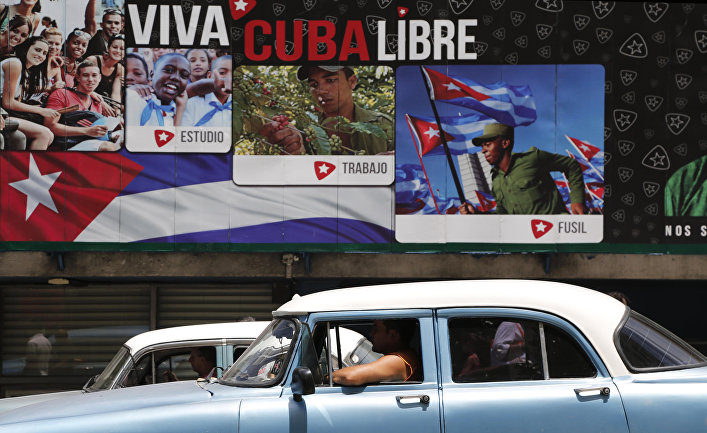Raul Castro, speaking at the UN General Assembly, criticized the US's economic embargo on Cuba, demanded the return of Guantanamo, as well as termination of the broadcast transmission of anti-government radio station "Radio Marti." Cuban leader defended Nicolas Maduro and Rafael Correa, as well as Syrian President Bashar al-Assad. Positioning Cuba with countries such as Iran and Russia, he supported the demand for the independence of Puerto Rico. Castro criticized the market economy, concluding by quoting his brother Fidel, which clearly fits into the framework of the mandatory revolutionary Cuban liturgy.
Shortly after his ardent speech, Castro met with the US president. Washington Post writes that Obama reminded his Cuban counterpart of the need to respect human rights and democracy on the island. The talks did not manifest the slightest hint of political openness.
US commerce secretary urges Cuba to develop private sector and warns ending embargo will take time: http://t.co/FpGsnoZ7Na
— The Associated Press (@AP) October 8, 2015
Barack Obama has no clue why he and Raul Castro turn quid pro quo — “you tell me, I tell you.” For the Castro brothers the best system in the world is a socialist one, the best democracy in the world is Cuban, and as far as all the dissidents, “Ladies in White,” protecting civil liberties are well payed agents of the US Embassy, who deserve the most severe punishment.
The Cuban government does not seek to correct any mistakes or agree to errors. It still insists on the fact that all the faults are caused by the United States, which is trying to spread its imperial power in the world. Cuban leaders believe that capitalism sows misery across the world and a market economy is to blame for the fact that the world is dominated by dirty competition based on inequality and lack of empathy.
Cuba to US: We don’t want your food http://t.co/D2H2C5lZuA via @PoliticoAgenda | AP Photo pic.twitter.com/Tns2CvOsV4
— POLITICO (@politico) October 6, 2015
Castro and his faithful Marxist-Leninists companions are characterized by complete indifference to current reality. They believe that all problems can be solved on the basis of collectivism, managed by the military, with the Castro family ruling on top.
Raul, Fidel and their entourage are proud of the fact that in the 60s they were able to lead the national — liberation movement around the world. At that time magazine “Tricontinental” was created, which the published subversive articles prepared by the Cuban intelligence services.
Cuba deeply honors Che Guevara, who arrived in Bolivia to organize the guerrilla movement, where he was wounded, captured and killed the next day.The socialist country has honored the memory of hundreds of militants who fought around the world, including Venezuela, Argentina, Colombia, Peru and Uruguay. Cuban fighters passionately remember their younger years in Angola, Somalia, Ethiopia, where they were fighting for the sacred ideas of communism and the glory of the Soviet Union.
At the same time they do not feel the slightest remorse for killing thousands of ideological opponents, homosexuals, and believers for the sake of the future of the revolutionary glory. Their property was confiscated, families destroyed, many were imprisoned.
Is the suffering of ordinary people so important, when it comes to the possibility of changing history?
Those were the great days of the Cold War, when Cuba was on the edge of the world revolutionary struggle against the US and Western stooges. But then Gorbachev came to power and betrayed the revolutionary ideals, when it seemed it was so close and the Red Army would march triumphantly through the streets of Washington.
Obama doesn't get the Castro brothers. Born at a later time, he was not able to assess the merits of his predecessors: Eisenhower, Kennedy, Johnson, Nixon, Ford, Carter, Reagan, Bush Sr., who defended the country from the real Soviet threat. Clinton, who was in office in the post-Soviet period, understood the nature of the Cuban regime and extended the Helms-Burton Act.
Easy Money: Cubans leave island to retire in Florida with US benefits… http://t.co/uE5puzNe7u
— DRUDGE REPORT (@DRUDGE_REPORT) October 10, 2015
George W. Bush has inherited from his father an understanding that the 90 miles away from the United States is an enemy which must be fought.
Current US President is different. He came to power 18 years after the fall of the Berlin Wall, and the Cold War is something distant and incomprehensible. Obama did not feel that there are countries such as Cuba and North Korea, which could be a real threat.
In his younger years, he worked for a church charity. As a "social organizer" young Obama helped residents of disadvantaged African-American areas in Chicago. All his life he was inspired by the history of the struggle for civil rights. His leitmotif was to change America, not to defend it from external enemies.
Like many American liberals and radicals of the younger generation, Barack Obama thought that Cuba was the victim of the US's imperial greed, and can be reformed as soon as Washington stretches its arm.
Obama is not able to understand that Raul will bite his hand instead of shaking it.
He does not know that the true Stalinists die, sinking their teeth into the throat of the hated enemy. It is part of a revolutionary character.






